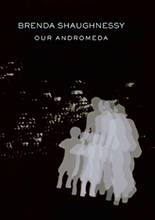 If you’ve made a New Year’s resolution to read more poetry (and I certainly hope you have), may I recommend you kick-start your new poetic regime by picking up a copy of Our Andromeda, Brenda Shaughnessy’s most recent collection. Our Andromeda was chosen by the New York Times as one of the “100 Notable Books of 2013” and was shortlisted for both the 2013 International Griffin Poetry Prize and the PEN/Open Book Award. It also featured on NPR’s list of “5 Books of Poetry to Get You Through the Summer,” but don’t let that put you off.
If you’ve made a New Year’s resolution to read more poetry (and I certainly hope you have), may I recommend you kick-start your new poetic regime by picking up a copy of Our Andromeda, Brenda Shaughnessy’s most recent collection. Our Andromeda was chosen by the New York Times as one of the “100 Notable Books of 2013” and was shortlisted for both the 2013 International Griffin Poetry Prize and the PEN/Open Book Award. It also featured on NPR’s list of “5 Books of Poetry to Get You Through the Summer,” but don’t let that put you off.
Poet Joy Katz describes Our Andromeda as “three-quarters cool thinkiness and one-quarter passion that’s all released at the end,” and that’s pretty apt: the first part of the collection consists of more formal, reserved ruminations on birth and motherhood, illness, and the frailty of the human body (though humor, puns, and allusion also abound)—and then comes the collection’s final, eponymous poem, a twenty-two-page letter to Shaughnessy’s son Cal, who suffered a brain injury at birth that has left him blind and without speech. It’s a raw, primal poem that addresses the anger and grief Shaughnessy feels in the aftermath of this traumatic birth. Some of her fury is directed at the people who have failed her—incompetent doctors, unsympathetic friends (“stay-at-home moms who had once / been talented but were now pretending / they were not in order ‘to raise a family’ / and to slide into inanity”)—but much of it is directed at the author herself:
Cal. I can blame just about anyone for what
happened to you, but ultimately it was my job
to get you into this world safely. And I failed.
The Andromeda of the title is an imagined world, a place where we get to do things over:
When we get to Andromeda, Cal,
you’ll have the babyhood you deserved,
all the groping at light socketsand putting sand in your mouth
and learning to say Mama and I want
and sprinting down the yardas if to show me how you were leaving
me for the newest outpost of Cal.
Shaughnessy oscillates between this imagined world and reality, between acceptance and regret, and she is never afraid to confront the torment of the “what-ifs.” The two sections of the book work beautifully together, with the first part’s Plath-like chilly brilliance—all language play and internal rhyme—balancing the latter section’s more impassioned tone. And if, like me, “soppy books about motherhood” are on your UGH list, don’t worry, you have nothing to fear from Our Andromeda; Shaughnessy’s brilliance, rage, and humor keep the collection from straying into motherhood-is-magical! territory (“Stop belonging to me so much, face-head,” she writes). Here are a couple more excerpts from the out-of-this-world Our Andromeda:
from Liquid Flesh
I’m a mother now.
I run to the bathroom, run
to the kitchen, run to the criband I’m not even running.
These places just scare up as needed,
the wires that move my handsto the sink, to the baby,
to the breast are electrical.
I’m in shock.One must be in shock to say so,
as if one’s own state is assessable,
like a car accident or Minnesota taxes.A total disaster, this sack of liquid
flesh which yowls and leaks
and I’m talking about menot the baby. Me, this puddle
of a middle, this utilized vessel,
cracked hull, divinedesign. It’s how it works. It’s how
we all got here. Deform
following the function . . .But what about me? I whisper
secretly and to think,
around these parts used to bethe joyful place of sex,
what is now this intimate
terror and squalor.My eyes burned out at three a.m. and again
at six and eleven. This is why the clock
is drowning, as I said earlier.I’m trying to explain it.
I repeat myself, or haven’t I already?
Tiny self, along with a tiny self.* * *
From Artless
No poetry. Plain. No
fresh, special recipe
to bless.All I’ve ever made
with these hands
and life, lesssubstance, more rind.
Mostly rim and trim,
meatlessbut making much smoke
in the old smokehouse,
no less.Fatted from the day,
overripe and even
toxic at eve. Nonetheless,in the end, if you must
know, if I must bend,
waistless,to that excruciation.
No marvel, no harvest
left me speechless,yet I find myself
somehow with heart,
aloneless.With heart,
fighting fire with fire,
fightless.
